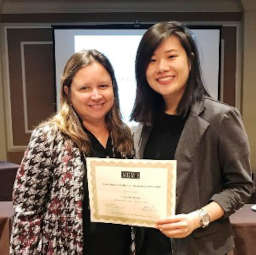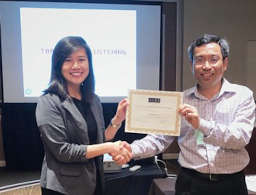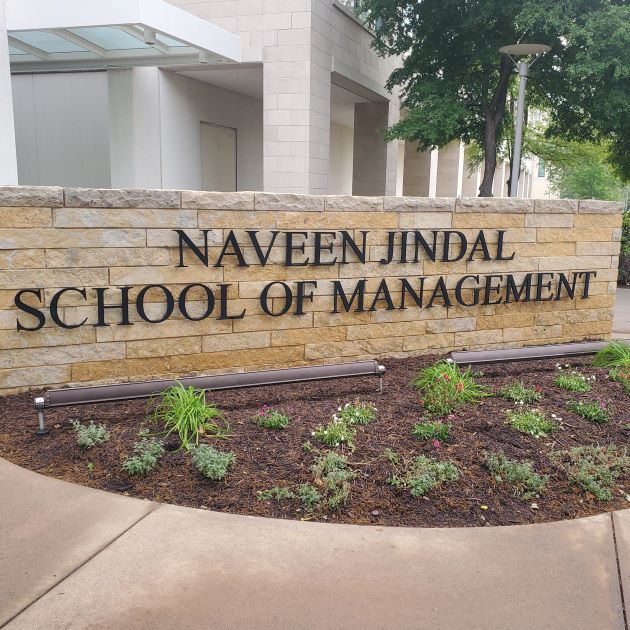Senior marketing major Claudia Kwee acknowledges that as someone looking for a business school education, she did not initially give research much consideration. “I actually came into UT Dallas thinking research was primarily for science majors,” Kwee says.

But that changed, particularly as she came down the back stretch of her undergraduate years and realized the immense effect mentoring had on her. As a freshman, she had concerns when it came to finding career paths and organizations that fit her passions. However, her marketing professors soon stepped in as important early mentors to offer key direction, she says. Later it would be Kwee’s turn to mentor, through teaching a course for incoming undeclared students, winning the outstanding Staff Member of the Year award that recognized her efforts as a peer advisor, and serving as the vice president of scholarships and awards for her business fraternity, Delta Sigma Pi.
Kwee wanted to find out through research if her positive experience with mentoring was unique or if this was an underutilized higher education resource.
Enter Dr. Julie Haworth, director of JSOM’s BS in Marketing program, who had mentor-related research from her Product and Brand Management (MKT 3320) course to offer, along with knowledge of other helpful literature on the topic.
Kwee, who performed the research as an independent study project, combined Haworth’s influence with student and staff interviews. “There were two types of interviews,” she says. “The first was with senior business students to reflect on their time in college, and then I did another set with higher education administrators, both associate deans and an assistant director of undergraduate advising, getting their perspective.”
Her analysis resulted in the project, “The Impact of Mentors on Student Productivity.” More qualitative than quantitative to that point, Kwee’s initial findings were that mentorship improves both productivity and self-efficacy, and she found room to expand on previous mentorship categories from other research. Her next goal was to turn more to the quantitative with a survey approach.
Still, Haworth believed there was already enough information to take her results on the road. Or at least down the road to Houston.
Kwee presented her research on March 14 — during spring break — at the Association of Collegiate Marketing Educators conference.

She spoke to about 20 professors and students in attendance, and she says the experience both gave her an extra push to continue research as well as a helping hand for an upcoming role at Charles Schwab. She will be starting as a senior specialist, acquisition marketing, beginning after she graduates in May.
“It was my first time presenting to someone other than Julie Haworth or,” she laughs, “my mirror. It was a little outside of my comfort zone, but it was a good step. Along with my nervousness was a huge sense of excitement. I had a chance to present the work that I had been constantly developing this past semester and show people what I’d learned — that there is a fundamental need for mentors in higher education.”
Haworth, who sat in on Kwee’s talk, was impressed. “You wouldn’t know it was her first time presenting in that environment,” she says. “I see her research potentially going as far as she wants to take it. Her enthusiasm tells me she’s found something that inspires her. That’s great to see.”
And more presenting is slated to come, her paper having been accepted for the Collin College Undergraduate Interdisciplinary Student Research Conference on April 24. In addition, she is entered in the campus-wide Undergraduate Research Poster Contest to be held April 16, qualifying to compete by winning an Undergraduate Research Scholar Award.
Kwee, who also won an OWLIE Master Mentor Award in 2018, feels forever changed by these events. She says she has come to realize that research has not only added to her breadth of experiences and knowledge but also has played an integral part in shaping her ability to think creatively and find solutions.
“Throughout it all, I began to realize that this project was more than just ‘checking off a box’ before I graduated,” she says. I sincerely wanted to help students find ways to increase their productivity and success, to understand how my role as a mentor actually affected those around me and to change the status quo. Research can be found anywhere, even in business, and I wanted to highlight that through my experience.”





